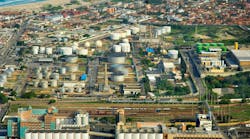By OGJ editors
HOUSTON, May 14 -- BP PLC has signed contracts with several ethanol suppliers in order to phase out the use of fuel oxygenate methyl tertiary butyl ether (MTBE) in the gasoline BP sells in California by the end of this year.
"We considered all of the factors within our control and determined that we could transition from MTBE to ethanol early," said Bob Malone, BP's regional president.
California Gov. Gray Davis (D) has delayed the state's MTBE ban until Jan. 1, 2004. A 1999 executive order had direct refiners to stop selling gasoline that contains MTBE by Dec. 31, 2002, because of concerns that the additive contaminates groundwater.
Praise
Renewable Fuels Association Pres. Bob Dinneen commended BP. "I believe California consumers will reward oil companies like BP that make an early switch away from MTBE. And I hope other companies marketing gasoline in California will follow BP's lead," he said.
"BP's decision makes a strong statement about the ability of the US ethanol industry to replace MTBE," said Dinneen. "Since Gov. Davis signed his original MTBE ban 3 years ago, the ethanol industry has added 1 billion gal of production capacity."
Criticism
Meanwhile, MTBE producers and some oil companies say a ban on MTBE will mean higher prices and a possible fuel shortage.
A study commissioned by the California Energy Commission, conducted by Stillwater Associates, said that, assuming federal clean fuel rules still require an oxygenate mandate of 2 wt %, there could be a gasoline supply shortfall of 5-10% in the state (OGJ, Mar. 4, 2002, p. 25).
The Oxygenated Fuels Association issued a statement critical of BP's switch to ethanol. "It is no surprise that oil companies like BP are once again putting profits ahead of people...They just don't care about consumers paying up to double today's prices for gasoline because it means higher profits in their pockets."
